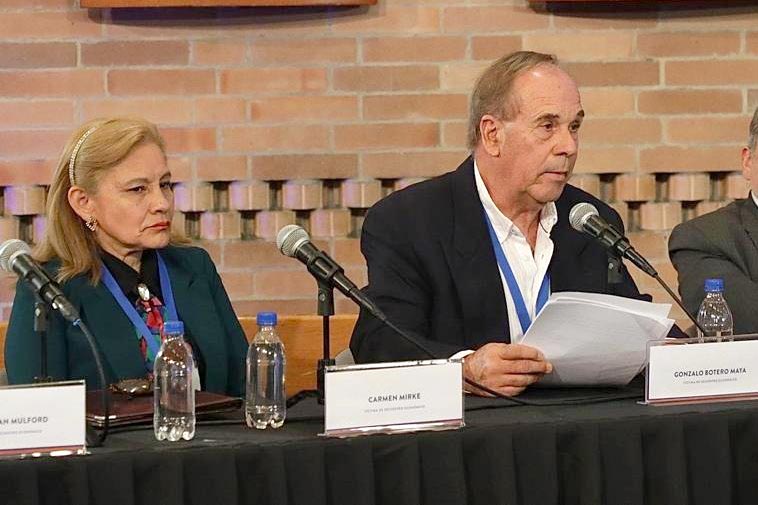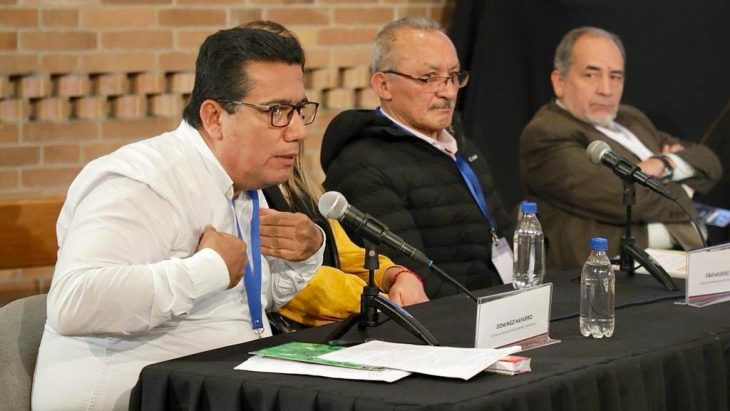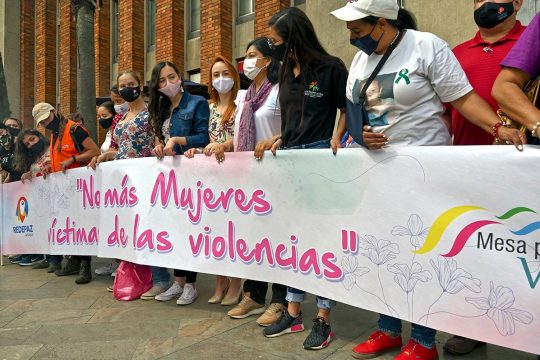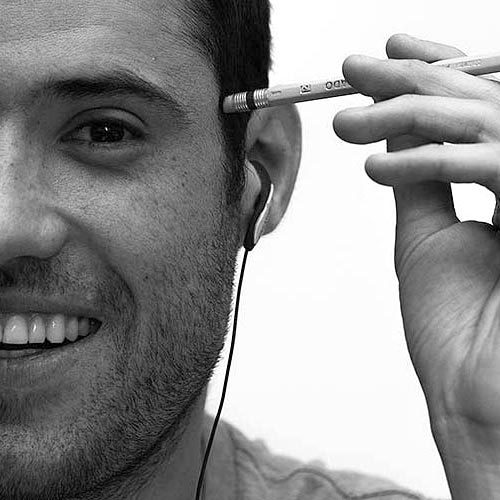“In a country where justice advances at a snail’s pace, it has been a positive surprise”, says Gonzalo Botero Maya, a cattle rancher from the Mompox Depression in Colombia’s Caribbean who, three decades ago, was kidnapped by the former Revolutionary Armed Forces of Colombia (FARC) rebels and only released after his family paid a hefty ransom.
Those laudatory words come from an unlikely ally of the Special Jurisdiction for Peace (JEP), the judicial arm of the country’s transitional justice system. In late 2016, when the government of then president Juan Manuel Santos and the FARC signed the deal that led to the disarmament of the oldest rebel group in the Americas and to the establishment of that special tribunal, Botero voted 'no' in the plebiscite which gave Colombians the chance to have a say on the peace negotiation. In his opinion, Santos' eagerness to close a deal and his personal ego led to an accord that was too benevolent with his victimizers and saddled the Colombian state with the responsibility of paying for redress of FARC’s victims.
The narrow triumph of the 'no' vote, by 53,000 votes, underscored a sharp division among Colombians. The subsequent renegotiation, in which the Santos administration and the FARC incorporated many of the changes proposed by opposition leaders, who considered them cosmetic, meant that the agreement came to life, albeit with a legitimacy deficit. Six years later, after the end of Iván Duque’s right-wing government which brought together the 'no' coalition, and the arrival of the first leftist president in the country's history with a promise of deepening peace even further, Botero continues to vindicate his negative vote.
“Serious, consecrated and tenacious work”
But he also steadfastly defends the JEP, which is about to convict seven former FARC leaders for their criminal policy of kidnapping thousands of people - like him - to collect ransoms, press for hostage exchanges with the government or keep territories under their control, which the tribunal deemed war crimes and crimes against humanity. “I have to recognize the serious, consecrated and tenacious work that justice Julieta Lemaitre [judge rapporteur of the JEP Case 01] and her team have carried out. I have felt this personally as a victim and I thanked her publicly,” he said in an interview with Justice Info.
His case is not an exception. Like him there are other victims who, while still critical of the peace agreement that led to the disarmament of 13,000 guerrillas and the transformation of the FARC into a political party, have given transitional justice credit. They are among the more than 3,000 victims who have been accredited as parties in the macro-case on that guerrilla’s kidnapping policy. Some were even present at the public hearing last June in which the now defunct group’s leadership acknowledged, for the first time without euphemisms, both their cruelty in having kidnapped some 21.396 Colombians over two decades and the suffering endured by the hostages’ relatives.
Domingo Navarro, kidnapped for 22 days
Domingo Navarro was a 24-year-old when he ran for mayor of Cimitarra, the sweltering cattle and cocoa-growing town in Santander's Magdalena Medio where he was born and to which he had returned upon graduating as a journalist in Bogotá. He set up a radio station to, in his words, "do the independent journalism that was so badly needed", but soon after he decided to put his name forward to run a municipality as isolated as it is extensive, larger than Luxembourg, as part of the political group led by former minister Horacio Serpa.
It was a turbulent time in a town that had endured several bloody massacres committed by extreme right-wing paramilitaries and left-wing guerrillas, but where the locals were also innovating strategies of non-violent resistance. One of its peasant organizations, the Carare Farmworkers’ Association, won Sweden's Rights Livelihood or 'Alternative Nobel' prize.
On July 1, 1997, Navarro was exhausted. As a campaign strategy, he’d been organizing health brigades to visit the most far-flung rural corners of Cimitarra and talk to potential voters. He was about to return home after a four-hour walk through the hamlet of La Muñeca, 50 kilometres from town, when a peasant stopped them and said he had a severe toothache. The dentist accompanying Domingo couldn’t find the source of his ailment, but the man insisted. Soon after, eight armed rebels from FARC’s 46th front arrived and led them to the mountains of Puerto Parra. Navarro was kidnapped for 22 days.
They did not demand money from his family. According to him, the only answer the local commander gave to his questions - why had they kidnapped him, how long would they keep him, what did they want to talk to him about - was “we don't know”. Although he continues to thank God for his sudden release without explanations, that freedom came at a cost. He lost the elections and to this day attributes his defeat to the kidnapping and the double suspicion it brought upon him. On the one hand, “people said my release meant I had an agreement with FARC,” he says. On the other, rumours circulated that he’d been snatched because he was an accomplice of the paramilitaries, an accusation that especially hurt him since they murdered his brother and dumped his body into the Carare River.
“A very useful process, but still incomplete”
“It’s been 25 years since my kidnapping and only today was I able to talk about it. I haven't even discussed it with my family,” he told his former captors last June, during the JEP’s hearing, before making a specific request: that they clear his name. “Right off the bat I’d like to acknowledge that your kidnapping was a crime against humanity ordered by me,” replied Pastor Alape, the former guerrilla peace negotiator who at the time led the Magdalena Medio Bloc operating in the area. “I want to tell the country and Cimitarra that at no time did the FARC deem him a paramilitary nor was he a friend of ours.”
That answer gave Navarro some peace of mind and he believes this progress was achieved thanks to the JEP’s work, even though he maintains his critiques of the tribunal. “In terms of becoming familiar with details that I didn't know, I think it was positive”, he says, although he thinks FARC's acknowledgment in his case was watered down on the advice of their defence lawyers. For it to become more than a "half-truth," he says, specific information is still missing to understand if someone linked to his election rival was involved in his kidnapping. According to him, a member of that campaign was the son of a FARC leader and was later convicted. “One would like to know even the smallest detail: why they attacked me, who helped them, who fed them the information. To this day, I don't understand why,” he says.
Navarro, who managed to become mayor a few years later, says he is not opposed to the JEP’s sanctions - 5 to 8 years in a non-prison setting for the most serious crimes - being more lenient than in the ordinary criminal justice system. At the public hearing he praised the former FARC leadership’s decision to lay down their arms. But he asked the JEP’s justices that, in addition to opening more spaces for victims to address their perpetrators, they remain steadfast in demanding that indictees fulfil the three tasks underlying the special sanctions: that in addition to owning up to their role, they provide full truth and reparations to their victims.
In Navarro's words, “we don't want them to go to jail or die, but to tell the damn truth”. That is why, he says, “this has been a very useful process, but it’s still incomplete”.
Gonzalo Botero's catharsis
On Sunday, August 4, 1991, Gonzalo Botero arrived at his family's farm in San Fernando, on the banks of the Magdalena River, to give it a tour and look at their cows. He was unaware that fifteen rebels from FARC's 37th front had been there for a week, waiting for his twin brother to kidnap him. When they saw him and realized that he was the mayor of Magangué, they did not think twice and took him away. They made it clear to him, he remembers, that it was a purely economic kidnapping and not political, despite the fact that he was the main public authority of the second town in the department of Bolivar.
Botero was held hostage for 58 days in the nearby San Lucas mountain range until his family paid the ransom FARC demanded in exchange for his freedom. Not the four million dollars they initially asked for - a figure, he says, "so disproportionate that it was impossible to pay" - but one that still forced them to sell several assets and get into debt.
That payment left him with a mortification that still accompanies him and that he was able to express for the first time, face to face, during the JEP hearing last June. “It torments me day and night to know that well-earned money, a result of the honest work of several generations, without harming anyone, creating jobs, has gone into the coffers of a criminal organization to expand and strengthen its absurd and irrational actions,” he told the seven former FARC leaders. “I often ask myself: with that money, the fruit of my freedom, how many more people did you kidnap, how many more youngsters did you recruit, how many more towns did you besiege, how many more innocent human beings did you murder, how many policemen and soldiers - heroes of the homeland - did you torture and disappear, how many land mines did you plant?"
His question did not receive an answer. But it gave Botero the opportunity to seek catharsis and ask them what he hadn’t been able to in three decades. That day at the hearing and in the private meetings that preceded it, he complained about their cruelty and “the scars that cannot be erased and with which one lives for the rest of one's life”. Especially one that he relayed with a broken voice: despite the fact that a FARC commander told him before his release that they had no problems with him and asked him to continue working for the region, a few years later another rebel leader, 'Martin Caballero', declared the Boteros a military target and his men killed four of their employees on another family farm in Sucre.

"Better late than never"
Despite his reluctance on the peace agreement, Botero has been an active participant in the JEP’s proceedings. He says he’s read all the testimonies sent to him by justices, returned comments to them and that, when he asked for additional information, received it from them. “There has been fluid communication,” he says. That is why he did not hesitate when they proposed that he speak during the public hearing. “I was grateful that the JEP took me into account and gave me the opportunity to address them [his former captors]. I felt the need to speak respectfully but frankly. And I thanked them for listening to me,” he says.
Despite the absence of answers to some of his questions, for Botero that dialogue did not end at the hearing. In the six months since he has met Pastor Alape, the same man who asked Navarro for forgiveness, they met three times for a coffee. “I felt in them - I have to say - repentance for their deeds. At the time of the hearing I did not forgive them, but now I feel that the time has come to do so. The most important thing is that they do not relapse and that they move forward as good elements in society," says Botero, who was also twice a local councillor in Magangué and once a congressman for Bolivar. He is now retired from politics.
“Unfortunately it took 30, 40 or 50 years for them to realize that they committed atrocious crimes, but better late than never," he says. But he still sees no real willingness to materially redress their victims or, in cases where the direct perpetrators have died, to look for former comrades in arms who can answer their specific questions. “So much damage was caused that it is not enough. They still have a moral obligation to redress victims with their properties,” he adds.
Botero attributes an important part of the progress to the JEP team in charge of the case, which he describes as “responsible” and “stern with FARC”. “They’ve handled it with commitment and with a real interest in establishing the truth and that FARC’s leadership own up to their crimes," he says. Although he has suggestions on what could be improved. Above all, he believes that the biggest debt lies in the clarification of hundreds of cases where the whereabouts of the victims are unknown. The JEP’s indictment estimated that at least 627 kidnapped persons were murdered and 1,860 are still missing (amounting together to 11.6% of the total).
As he says, “I came out unscathed and here I am, but in the case of people whose relatives are still missing, no one has given them a reason yet. This process has been going on for six years now and they haven’t been able to tell them what happened or where their relatives are. We need more pressure, because time is running out”.
Waiting for the rulings
Botero and Navarro also agree that, despite its limitations, the transitional justice is doing what the ordinary justice system never did. “They didn't hold a single interview, they just filed it away,” Navarro says. It’s a stance many Colombians seem to share, as suggested by the most recent Invamer Gallup poll, which reflects a 12-percentage-point hike in the JEP’s approval levels over the past year, that in which the tribunal held its first public hearings.
“Many victims did not believe in the origin, but today, when they see the implementation, they recognize a legitimacy in its exercise. In other words, there’s still a questionable origin for them, because they would have liked to see FARC defeated, but today they identify results they never imagined could happen. And they feel that, so many years after the kidnappings, only now are they finding a response in terms of who was responsible,” says Gloria María Gallego, a professor at Eafit University who has written two books on kidnappings and has closely followed the work of the special tribunal. She also experienced four kidnappings in her family, including one by FARC.
For Gallego, this change in perception is underpinned by the fact that, though many victims resented any leniency towards their perpetrators, their distrust of the ordinary criminal justice runs very deep. The turning point, she feels, is that for the first time they are addressing their own responsibility. “Not the traditional one of retribution and punishment, but a reparative form of it – she points out – that before the world they own up to the facts, face their victims, admit the damage and the horror, vow never to commit similar acts again and, regarding those disappeared in captivity, identify what their fate and final resting place were.”
“You have a great disadvantage: you’re treading a path no one else has walked, in a peace process that is dissimilar to the rest in the world - the former mayor of Cimitarra told the JEP magistrates in the public hearing - You’re walking in a dark jungle without a flashlight and you have to do it on your own. Although I want to believe, I do want to wait for your rulings to say that you made history”. Botero says, more succinctly, “within the peace process, the JEP was something positive. It wasn’t all bad”.








